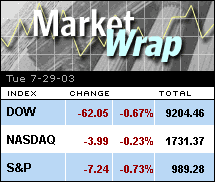NEW YORK (CNN/Money) -
Jittery investors sold stocks Tuesday after a sharp drop in consumer confidence exacerbated fears about the timeline of a pickup in the economy and the recovery in corporate profits.

Following the selloff, trading for the next few sessions could remain volatile as investors sort through a slew of economic news and more second-quarter earnings. In addition, stocks could start to face some competition from Treasury bonds, after the yield on the 10-year note jumped to its highest level in nearly a year Tuesday.
"It's been volatile and sloppy today. I'm not pleased with the action," said John Hughes, a market analyst at Shields & Co. "But we're not down that much, so you've got to put it in perspective. There's a lot of confusion about the confidence number and the bond market's reaction."
On the upside, Hughes added, it's still early in the week, and a lot of the other influential economic reports due later in the week could offer a more encouraging outlook.
Wednesday's economic report is the afternoon release of the Federal Reserve's "beige book," a broad look at the economy compiled by various regional Fed banks.
Thursday brings the preliminary reading on second-quarter gross domestic product growth, while Friday's reports include the July Chicago PMI, a regional manufacturing survey; the July unemployment report and the June reports on personal income and spending.

"Thursday's gross domestic product report is probably the most important," Hughes said. "The market wants it to show big improvement. If it just meets estimates, or misses them, you could see a selloff."
Economists surveyed by Briefing.com expect the pace of economic growth accelerated to a 1.5 percent annual rate from the first quarter's 1.4 percent annual rate.
Also likely to influence trade Wednesday are the heap of earning reports due before the bell. Aetna (AET: up $1.03 to $68.49, Research, Estimates) is expected to report quarterly earnings of $1.02 per share, up from 32 cents a year earlier. Other companies due to report include: Duke Energy (DUK: down $0.08 to $18.22, Research, Estimates), Goodyear Tire (GT: down $0.22 to $5.17, Research, Estimates) and CVS (CVS: down $0.72 to $27.75, Research, Estimates).
Tuesday's market
The Dow Jones industrial average (down 62.05 to 9204.46, Charts) and the Standard & Poor's 500 (down 7.24 to 989.28, Charts) index both lost 0.7 percent, while the Nasdaq composite (down 3.99 to 1731.37, Charts) lost 0.2 percent Tuesday.
Indexes briefly recovered at midday to trade near break even after a late-morning rumor circulated that deposed Iraqi leader Saddam Hussein had been captured, temporarily distracting investors from the weak economic news. However, the rumor was never confirmed and proved insufficient to shake off worries about the economic recovery.

The Conference Board said its July consumer confidence index fell to 76.6 from 83.5 in June. Economists surveyed by Reuters were expecting it to rise to 85.0.
The weak report was particularly surprising as it fell on the heels of positive economic news last week -- on durable goods orders and weekly jobless claims -- and seemed to contradict a mid-month consumer sentiment survey released by the University of Michigan, which showed some improvement.
Stocks have been essentially range bound for the past four weeks as investors have been waiting for economic and corporate news that is sufficient to justify the four-month rally. This report was not what they were looking for.
"This was certainly a surprise," said John Davidson, president and CEO at PartnersRe Asset Management. "It's definitely spooked stocks and raised worries about whether consumer spending, which is responsible for around two-thirds of the economy, is going to slow down, and how that will impact the recovery."
In particular, the report showed the effect of the lagging labor market on investor sentiment. Last Thursday's weekly jobless claims report showed a decline in the number of Americans filing new claims for unemployment for the first time in five months, but that may have been an anomaly, related to seasonal factors. Overall, even amid other signs of an economic recovery, the labor market has not participated.
However, Davidson noted that economic indicators can often offer mixed signals during a turnaround, and that seemed to be the case with Tuesday's report.
A negative response to DuPont's (DD: down $0.42 to $43.97, Research, Estimates) better-than-expected earnings demonstrated the ho-hum attitude investors have been taking in response to second-quarter earnings. Nearly two-thirds of reported earnings have surpassed forecasts, but you wouldn't know that from the stock reaction, which has been muted.
Tyco International (TYC: down $0.75 to $19.00, Research, Estimates) disappointed, and its stock fell 3.8 percent. The conglomerate earned 28 cents per share in the second quarter, down from 34 cents a year earlier and short of estimates.
On the upside, shares of McDonald's (MCD: up $0.89 to $22.15, Research, Estimates) gained 4.2 percent after the company reported earnings of 37 cents per share for the second quarter, down from 39 cents a year earlier but in line with the expectations of analysts surveyed by First Call.
Market breadth was negative but showed improvement from the morning. On the New York Stock Exchange, losers beat winners by more than 10 to 7 as 1.41 billion shares traded. On the Nasdaq, losers narrowly edged winners as 1.67 billion shares changed hands.
Treasury prices fell for the fifth straight session, despite the weak report on consumer confidence. The 10-year note yield rose to 4.44 percent, the highest since 4.46 percent on July 31, 2002, from 4.28 percent late Monday. The bond sank 1-5/32 of a point in price. Bond prices and yields move in the opposite direction.
The dollar was higher versus the yen and little changed against the euro.
Light crude oil futures added 13 cents to $30.24 a barrel in New York, while gold settled at $363.60.

|

